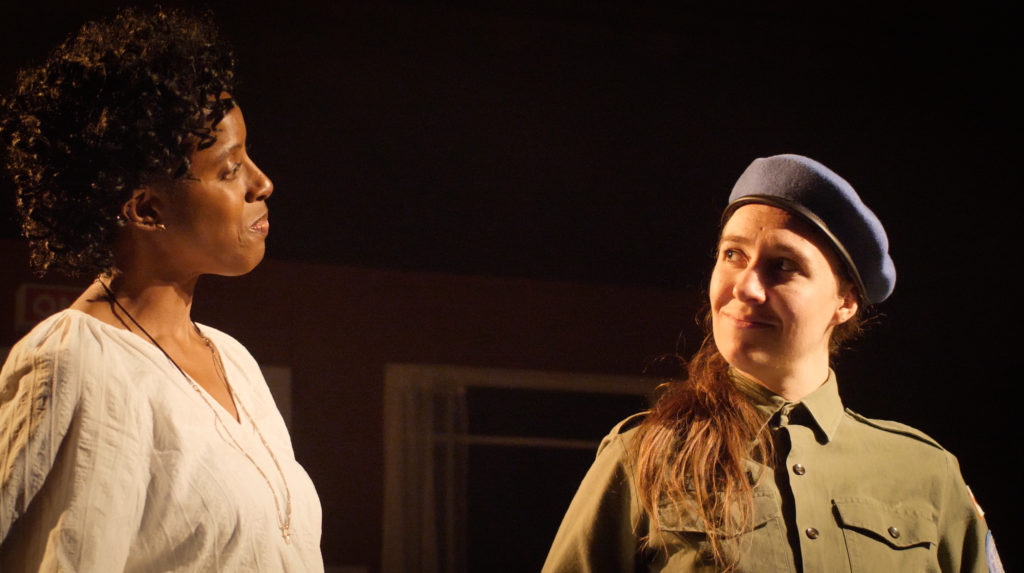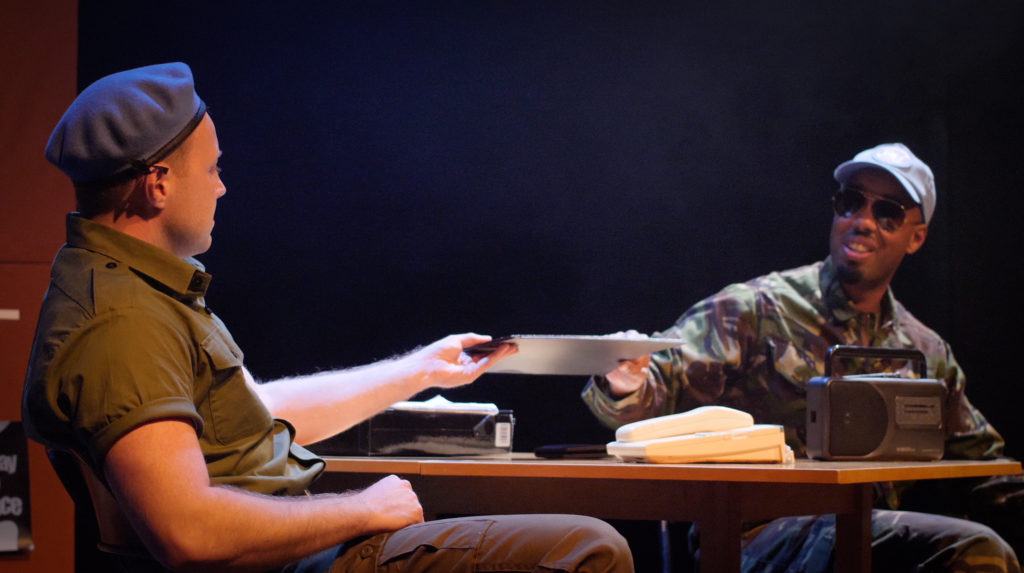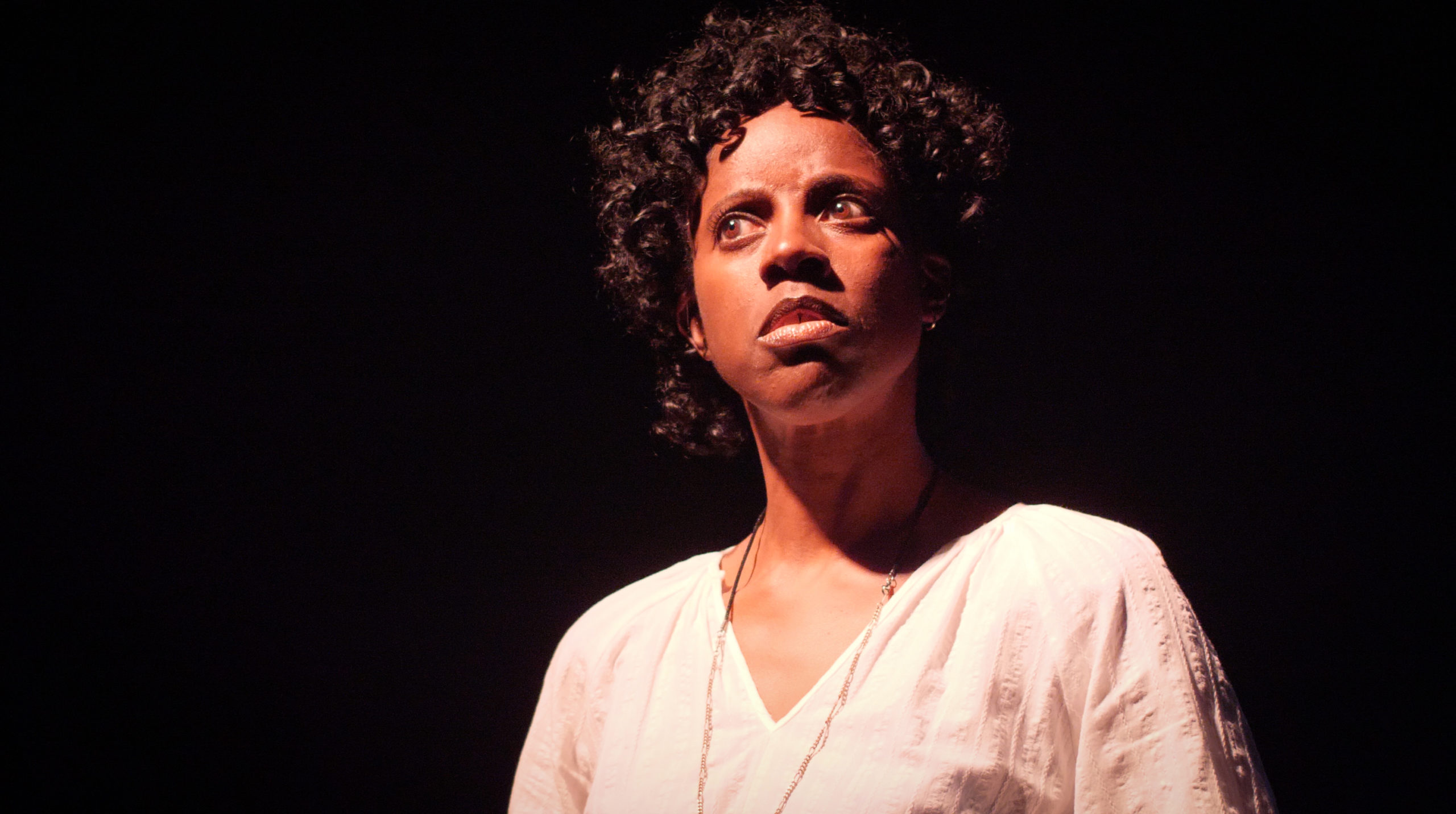Agathe – The Playground Theatre, London
The Playground Theatre sees the world premiere of Agathe, a look at the real life events leading up to the assassination of Rwandan head of state Agathe Uwilingiyimana.
Content warning: discussion of violence, murder and genocide.

Agathe
There can be few things more inspirational and more harrowing on the London stage right now. Agathe, a world premiere of a work by Angela J. Davis, tells the story of Agathe Uwilingiyimana who, for fourteen hours until she was assassinated, was Rwanda’s head of state.
The briefest of background expositions may help to set the scene further. In 1994, Rwanda had endured four years of civil war. President Juvénal Habyarimana, a dictator who consistently won over 99% of votes at the ballot box, led a fragile power-sharing agreement as a concession to Rwandan Patriotic Front (RPF). Meanwhile, a concerted campaign by those unhappy with the power sharing movement, moderate voices, and the perceived advancement of the Tutsi minority (the colonial role in deepening divisions is a whole different topic I suggest you read about at some point), was fomenting inter-ethnic violence. Weapons stockpiles grew. Training of Hutu youth commenced. Everyone was waiting for the spark to light the tinder on fire. The peacekeepers who made up the United Nations Assistance Mission for Rwanda (UNAMIR) had their work cut out for them.
When that spark – the assassination of President Habyarimana supposedly by Tutsi rebels – was lit, Agathe Uwilingiyimana was the unlikely figure thrust into the top job. A chemistry professor and advocate for women’s education and equal educational opportunities, she had held a range of government positions by 1994. And was in fact only caretaker Prime Minister by this point, awaiting a successor. But the Rwandan political system saw her assume the mantle of head of state for the briefest of periods.

A Fragile Peace Descends Into Violence
Agathe opens during this most fragile of peacetimes, immediately before the fatal chain of events begins. We see the Prime Minister (played by Natasha Bain) at work in the classroom. She laments her inability to enact real change with fellow politicians. A neighbour, a young Canadian peacekeeper from a nearby compound, drops by. The Canadian peacekeepers in the play, played by Maria Austin and Jordon Kemp, are one of the ways in which Davis has adapted the real life events to fit a theatrical format. They stand in for the larger peacekeeping contingent who lost their lives protecting Madame Uwilingiyimana, and allow the playwright to explore the theme of individual compassion and humanity vs. institutional insufficiency and inaction.
We follow Agathe as she navigates the unfolding events with dignity, bravery and pragmatism. Her goals progressively shift as the world gets smaller: from addressing the Rwandan public and attempting to calm the situation, to fleeing to the UN compound with her family, to finally sacrificing herself to protect her children. With a few changes to details (including the whereabouts of Agathe’s husband Ignace Barahira), this is largely the sequence of events which took place that night.
The story of Agathe Uwilingiyimana is important, and deserves to be shared and known. Her legacy lives on today in many ways, including the Forum for African Women Educationalists’ Agathe Innovative Award Competition. This play is another contribution to her legacy, bringing it to a wider audience.

Challenges and Opportunities in Dramatising Real Events
The transformation of a complex story to a fairly short and simple theatrical format is not without its challenges, however. For instance the Canadian peacekeeper characters didn’t quite work for me. They were occasionally a distraction. Watching Agathe and her son (played by Matthew Faucher) comfort their would-be saviours while confronting their own likely deaths felt either surreal or like an unexplored segue into African fatalism. I understood their purpose as a cypher and a way to tell the story with a smaller cast of characters. But ultimately I thought they intruded too much into the real events.
A few inconsistencies in accent also took me away from the story, which I found started to drag towards the end. Not what I expected from such an eventful subject. Perhaps this was partly the effect of having an interval within a relatively short play? I didn’t find the pause necessary and would have preferred to continue on without breaking the spell. Slightly clearer direction might also have helped to keep up the suspense in the more exposition-heavy scenes.
There were also things I very much enjoyed about the play. Bain turns in a solid central performance as the titular character. She brings out Uwilingiyimana’s resolve, dedication, faith and sacrifice. The scenes where Faucher doubles as an announcer on radio station RTLM were also very effective. Faucher’s rhyming couplets, thinly veiling calls to genocide, are chilling. They are also an effective means to bring the outside situation into the domestic setting. Esme Solomon’s set supports these switches seamlessly.
And the final character, Mbaye Diagne (Rio Attoh-Wood), was for me a standout. The character is based on a real Sengalese peacekeeper. Circumnavigating UN rules, he single-handedly rescued hundreds of Tutsis and others from certain death. His role in the events portrayed is not quite as we see it, but he was instrumental in rescuing Uwilingiyimana’s children after their parents’ death. An inspirational figure deserving of his own theatrical legacy, and Attoh-Woods captures the charisma and understanding of human nature which made his exploits possible.
All in all, the importance of the story for me outweighs some of the more technical challenges I perceived. A meaningful exploration of how a myriad of factors can create a crucible in which the best and worst of humanity is exposed, Agathe reminds us of important lessons still to be learned 30 years on from Rwanda’s genocide.
Salterton Arts Review’s rating: 3/5
Agathe on until 4 May 2024. More info and tickets here.
Trending
If you see this after your page is loaded completely, leafletJS files are missing.

